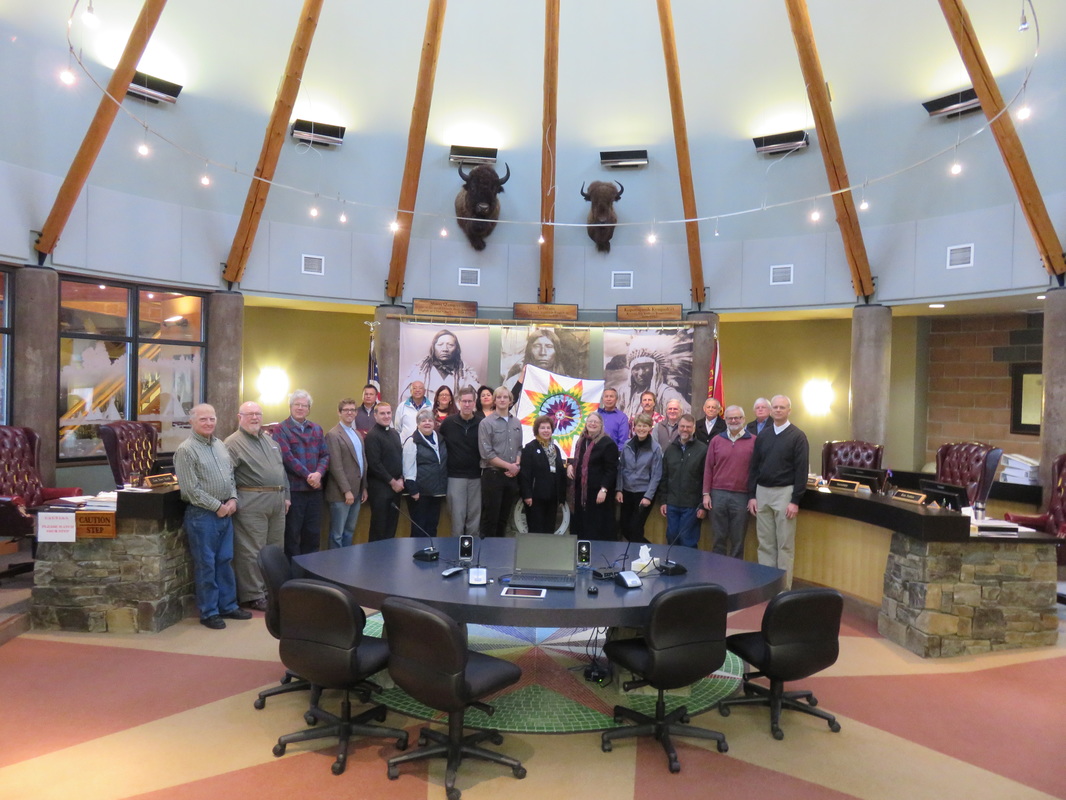|
We offer our support for the honoring of treaty rights, the healing of lives torn asunder by forced cultural changes, loss of language, racism and poverty."
Do you recognize those words? They are not my words. They are the words adopted by the Montana Synod Assembly, as part of our Apology to the Tribes. In the last 2 weeks I have had several opportunities to contemplate more deeply the implications of our Apology. Two weeks ago, the weekend before Thanksgiving, a small group from our Synod traveled to Airdrie, Alberta to meet with Canadian Lutherans and Anglicans in a gathering we called "Abiding in Right Relations." It was a two day meeting of native and non-native people for education, conversation, worship and reconciliation. Canada has recently completed a Truth and Reconciliation process (inspired by South Africa) on the harm done to indigenous peoples who were forced into church-run boarding schools. We heard stories of grief and loss, and stories of hope. Together we learned about the harmful residue of the Doctrine of Discovery, and pledged to listen to one another as we work for reconciliation and healing. During our worship we confessed: "It is said that, in Christ Jesus, we are all children of God through faith, but we know that we have often failed to be god and loving. You are our creator. You created us in your image, blessing us with our many differences. You created us a people with different gifts and different needs, as male and female, as yellow and red, black and white. It is these differences that we have condemned, not seeing them as your way of strengthening your family, but declaring these differences to be less than holy. We pray for forgiveness and compassion that we may come together in the circle. We ask this in the name of your Son Jesus who walked among your human family." And then this week, a group of clergy and laity from the Montana Synod met with the Tribal Council of the Confederated Salish and Kootenai Tribes, to present the Apology to them. Each reservation has its own history and dynamics. We never know what kind of reception we will have. As we began our presentation, Council members were busy looking at their agendas, anticipating what the next items would be. But as we described why we were there, that our faith compelled us to seek forgiveness and to seek reconciliation, Council members became interested. And as we presented the copy of the Apology, the traditional gift of tobacco, and the quilt incorporating a native prayer wheel and a Luther seal, there was genuine interest. Several council members thanked us, saying that our simply showing up said a lot. We had conversation about ways we might live out our commitment to accompaniment. Among the issues that are crucial to the members of the Tribal Council are the environment, the water compact recently enacted, and the devastating effect of drugs , especially on the young. We offered our prayers, and our advocacy, committing ourselves to becoming more educated on the past, so that we can work together in the future. Quoting again from the Apology: "Let it be known to all the Tribes that our door is open to you and we are here to listen and to work for a better tomorrow for all of the Creator's people." Jessica Crist, Bishop
0 Comments
Leave a Reply. |
Bishop Jessica Crist
Bishop of the Montana Synod of the ELCA Archives
August 2019
Categories |
